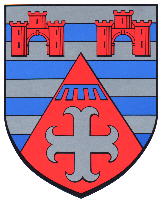Garnich: Difference between revisions
Knorrepoes (talk | contribs) m (Text replace - "'''Origin/meaning :'''<br/>" to "====Origin/meaning====") |
Knorrepoes (talk | contribs) m (Text replace - "[[Literature" to "{{media}} [[Literature") |
||
| Line 17: | Line 17: | ||
The point represents also the local Reiberg, a characteristic mountain in the municipality. | The point represents also the local Reiberg, a characteristic mountain in the municipality. | ||
{{media}} | |||
[[Literature]] : Loutsch, J-C. et al.; Armorial communal du Grand-Duché de Luxembourg, Fisch, Luxembourg, 1989, 331 p. | [[Literature]] : Loutsch, J-C. et al.; Armorial communal du Grand-Duché de Luxembourg, Fisch, Luxembourg, 1989, 331 p. | ||
Revision as of 21:49, 8 July 2014
| Heraldry of the World Civic heraldry of Luxembourg |
GARNICH
Origin/meaning
The arms were granted on November 29, 1982.
The lower part of the arms (point) show the arms of Sterpenich, in Belgian Luxembourg. The Lords of Kahler, one of the vilalges in the municipality, originated from Sterpenich.
The castles and the bars are derived from the arms of the Sergeant Mershalls of Luxembourg, who owned the villages of Garnich, Dahlem and Hivange. The original arms are the arms of Luxembourg with the two castles placed on both sides of the lion. The lion is removed in the arm sof Garnich.
The point represents also the local Reiberg, a characteristic mountain in the municipality.
Contact and Support
Partners:
Your logo here ?
Contact us
© since 1995, Heraldry of the World, Ralf Hartemink 
Index of the site
Literature : Loutsch, J-C. et al.; Armorial communal du Grand-Duché de Luxembourg, Fisch, Luxembourg, 1989, 331 p.











